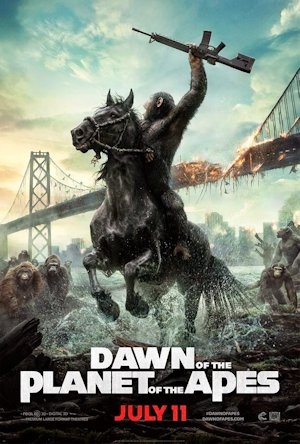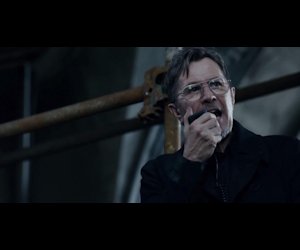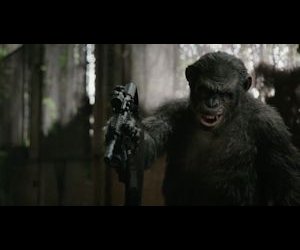Movie Review: Dawn of the Planet of the Apes
 | | The movie delivers on the promise of this image: you will see an ape riding a horse and holding a machine gun |
2011's Rise of the Planet of the Apes was a surprisingly clever reimagining of the Planet of the Apes franchise, telling an origin story rather than a science-fiction parable like the original 1968 film. It invested most of its time and energy into making the lead ape, Caesar, a compelling and sympathetic character swept away by his newfound intelligence. The sequel, Dawn of the Planet of the Apes, wisely sticks with Caesar, picking up his story ten years after finding his home on the other side of the Golden Gate Bridge, but this is a very different story, one that deals less with the science-run-amok trope of its predecessor and more with the concept of survival and the nature of conflict.
The virus has wiped out most of humanity, but a small pocket of survivors has created a makeshift civilization in the heart of San Francisco. Alas, with power dwindling, a group is sent to restart a hydroelectric dam, which just happens to sit in Caesar's territory. Though first contact between the intelligent ape culture and the survivors is nearly disastrous, both sides wisely opt for a careful, diplomatic approach. Of course, we know where this story has to go, and it isn't long before the promise of peace is lost in a sea of bloodshed. Remarkably, the story doesn't try to paint one side of the conflict as wholly to blame, choosing instead to show how simple misunderstandings and prejudice infect both groups, forcing the inevitable confrontation.
Even more remarkable is how the film is able to elicit an emotional connection with not just Caesar (played once again by Andy Serkis), but with several primate characters that are at times more well-drawn and diverse than the humans. The effects go a long way in making this possible, improving upon the startling work done in 2011 to give us an even more realistic and seamless take on the various apes. Audiences are likely to forget that these intelligent creatures--which take up at least half the movie on their own--are not actually real.
 | | Not really a central character, believe it or not |
Ironically, most of the secondary human characters don't feel as human. Gary Oldman gets far less screentime than one expects, even though he plays the leader of the human colony, an ex-military man named Dreyfus who lost his family during the chaos of the preceding ten years. Dreyfus is deeply underdeveloped, and in the hands of a lesser actor, he might not have even made an impression. He is used--alongside the cartoonishly racist Carver (played by Oz alum Kirk Acevedo)--to demonstrate human prejudice, but his prejudice against the apes doesn't appear to stem from anything other than a refusal to believe that intelligent apes exist. This is unusual, since the ape counter-point, Koba (Toby Kebbell), is completely understandable in his hatred and distrust, even as his character spirals more and more out of control.
Fortunately, the main human characters, a small family unit, are better drawn. Jason Clarke plays the lead, Malcolm, who is doing his best to keep the inevitable war from happening with the help of his new wife Ellie (Keri Russell) and his son Alexander (Kodi Smit-McPhee). Malcolm and Caesar play off each other well, seeing in each other the potential for cooperation. Both characters explicitly fight to preserve their families, their homes, and their struggling civilizations, but both characters are blindsided by the violence when it finally starts.
 | | This is not a movie for young kids is what I'm saying |
And when the violence starts, it doesn't hold back. The second half of this movie is brutal and terrifying, and the entire thing is filled with a sense of dread and helplessness that is usually the exclusive realm of really good war films. There is one shot that exemplifies this, with the camera spinning around a fire-soaked battlefield atop the barrel of a tank as it is overtaken by an ape. It's more than just clever, eye-catching camera work; it shows the dizzying terror found in the moment when the tables of war turn, when unwarranted confidence is bludgeoned to death. Director Matt Reeves proves himself by doing very different things this time around. Despite Caesar and the narrative continuity that ties them together, this movie and its predecessor have completely different tones and messages.
Where Rise makes clever allusions to the original film, Dawn starts to address its thematic concerns: what is the nature of civilization and how does it fail? However, much like Rise does, Dawn flips these ideas on their head. In the original Planet of the Apes, Charlton Heston's Taylor spends the majority of the movie certain that humans are superior to the apes, only to be proven wrong in the end, but in Dawn of the Planet of the Apes, it is Caesar who is proven wrong in his belief that apes are superior to humans.
The music is also more reminiscent of the original, with Michael Giacchino channeling the late Jerry Goldsmith. As sequels to reboots go, it doesn't get much better than this. Dawn is sure to be a tentpole in an action-packed summer, but it is more intelligent and original than audiences have any right to expect. It is provocative, but not ponderous. Above all, though, it is a thrilling ride well worth the price of admission.
FINAL SCORE:





Despite a few weak characters, this exciting sequel manages to improve upon nearly everything, offering the most intense take on the material in nearly 50 years.
|
-e. magill 7/16/2014
|
|